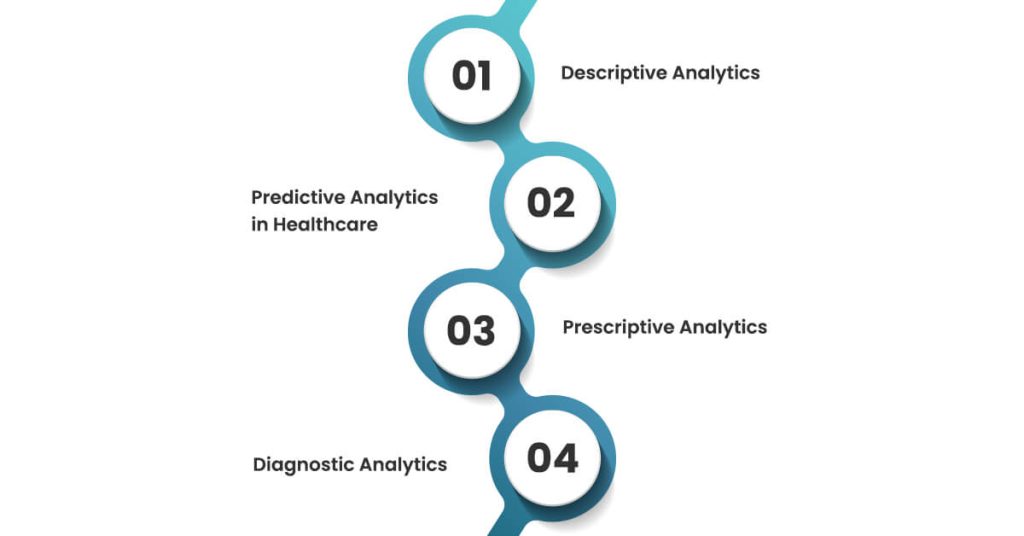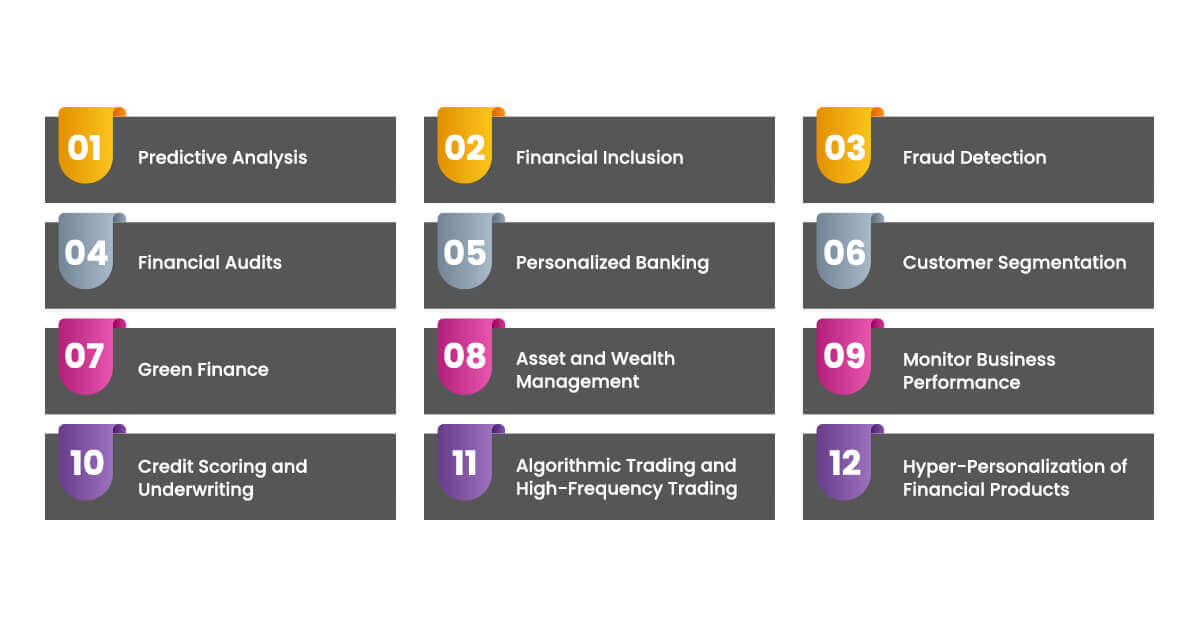Quick Summary
Healthcare data analytics is transforming the industry in 2024. Data analytics in healthcare is essentially extracting and examining large datasets to provide patterns that can help enhance patient care while reducing healthcare costs. There are four main types of healthcare data analytics: descriptive, predictive, prescriptive, and diagnostic. Each type serves different purposes, from identifying past trends to forecasting future events and suggesting actions for improved outcomes.
Introduction
In 2024, the demand is rising for better healthcare performance. The industry (healthcare organizations, clinics, and practitioners) wants to do more with less. Even policies and healthcare incentives are awarded to those healthcare units that lower costs, improve patient experiences, and show better results. This is where the healthcare industry is transitioning towards data-driven approaches. Data analytics is now at the core of healthcare development. Healthcare data comes from Electronic health records, Government health programs, Lab results, medical surveys, patient records, hospital data, healthcare insurance data, medical-grade IoT wearables data, etc. Data analysis from this data is speeding up drug discovery, helping create life-saving medicines quicker, and making healthcare systems work better and respond faster.
Advanced tools like artificial intelligence, statistical analysis, and machine learning employed to interpret the enormous amount of data deliver insights that help healthcare organizations in scaling their businesses. Reduction of healthcare costs, optimizing healthcare supply chains, faster new drug discovery, preventive medication, disease outbreak forecasting, and improved patient outcomes are the main objectives of data analytics in healthcare.
In this article, we’ll take a close look at how healthcare is using data analytics. We’ll see how it’s tackling some of the biggest problems in medicine.
What Is Healthcare Data Analytics?
Types of Healthcare Data Analytics

Each of the below categories of big data analytics in the healthcare industry calls for different tools and methodologies. Together, they form a comprehensive approach towards the improvement of healthcare organizations and patients through the effective application of data analytics in healthcare.
1. Descriptive Analytics
This type of analytics uses past patient data to identify trends and set benchmarks. It could determine the number of admissions, the average population BMI, and the treatments provided for specific illnesses. The technique involves basic statistics: averages, counts, percentages, and standard deviations for analyzing historical data. This form of advanced analytics in healthcare supports an organization in understanding past events in better detail.
2. Predictive Analytics in Healthcare
This approach makes use of data modeling and forecasting to predict future events or trends. It identifies at-risk patients who are likely to be hospitalized or may change over from home therapy to in-center care. Recent research suggests that predictive analytics may provide support in complex multiple chronic conditions. Healthcare professionals can develop predictive analytics in healthcare using big data to set models that forecast which patients require special attention to prevent critical health complications.
3. Prescriptive Analytics
Prescriptive analytics in healthcare suggest what actions can be taken to influence the outcome in the future. Using machine learning, prescriptive analytics gives decision-makers the capability to predict outcomes and make recommendations for improving patient care or changes in business strategies. In this way, big data analytics in medicine and healthcare is indeed quite beneficial for making informed decisions.
4. Diagnostic Analytics
Diagnostic analytics explains the “why” of a certain incident. That is, based on diagnostic analytics, questions like why a patient arrived at a hospital or why he or she left a treatment program would be explained. Diagnostic analytics investigates root causes in healthcare. It examines why patients are hospitalized or treatments fail. Distinguishing correlation from causation is crucial. Controlled experiments and regression analysis help understand patient outcomes and variable relationships.
Leverage advanced data analytics to enhance personalized healthcare solutions. Discover how today
Role of Data Analytics in Healthcare Industry
Let’s discuss a few examples of data analytics in healthcare examples for a better understanding:
1. Improving Drug Tests
Data analysis is changing how drug tests are done. By using big data, researchers can find good test subjects faster, predict results, and even simulate test outcomes. This approach helps design better tests, cutting the time and cost of bringing new treatments to market. Also, data analysis can help watch ongoing tests in real-time. This use not only speeds up new treatment development but also makes tests safer and more likely to give useful results.
2. Population Health Management
Advanced technologies such as AI in healthcare analytics have taken population health management to a whole new level. Data analytics provides an opportunity to give the most precise treatment through machine learning, artificial intelligence, and deep learning. This approach helps bring in early leads regarding what might lead to risks so that patient stability in health is attained before things worsen. Healthcare data insights gained from the proper use of data analytics also help in reducing the cost of treatment without compromising life risks. With fully maintained data records, health providers will cut the cost and serve timely effective care to a large population.
3. Health Monitoring
Possibly the most important application of data analytics in healthcare is monitoring patient health so that minor health problems do not develop into serious illnesses. With the application of healthcare analytics platforms, health experts can track patients’ data, analyze trends, and make predictions about risk disease conditions. Such a system ensures that the right care is delivered to patients at the proper time, thereby preventing chronic illnesses from occurring.
4. Making Supply Chains Better
Healthcare needs complex supply chains to get drugs, tools, and supplies to hospitals and clinics. Data analysis helps improve these chains by predicting needs, managing stock, and finding possible problems.
Despite increasing interest from both practitioners and researchers in recent years, green methods have seen limited adoption within the healthcare industry. The capability of Big Data Analytics (BDAC) holds significant potential for embedding environmental considerations into operations and supply chain management (OSCM), thereby enhancing the ecological performance of healthcare institutions
By studying past data and current trends, health groups can guess when and where certain items will be needed, cutting waste and making sure critical supplies are always there. This improvement saves money, boosts efficiency, and leads to better patient care by ensuring that needed supplies are always on hand.
5. Practitioner Assessment
Data analytics in the healthcare industry is critical for the assessment of performance by healthcare practitioners. The application of healthcare analytics software helps analyze patient reports and improve patient safety and the quality of care delivered. This analysis also breeds deeper empathy among physicians, for it allows them to understand experiences more profoundly. Data insights bring about improvement in the delivery of care practices by practitioners, thus providing ultimate attention to patients.
6. Predictions on Outbreaks
A substantial function of data analytics in healthcare is the capability of predicting disease outbreaks. Data trends empower healthcare organizations to forecast the severity of disease outbreaks in the community and possibly be given a window to control them a long time before the outbreak even happens. Big data analytics in healthcare gives a chance to medical professionals to collect vital information on emerging diseases. This helps them in preparations before the disease reaches a level of severity.
7. Preventive Measures/Care
In health care, preventive measures are considered to be most important to minimize the progression of diseases and improve outcomes in patients. It simply identifies a risk and offers preventive solutions. Hence, the impact of data analytics in healthcare is evident by analyzing patient data, healthcare providers are in a position to identify potential risks and take measures to stabilize the patient’s condition even before it becomes critical.
8. Tailored Healthcare Solutions
Data analysis is key to advancing personalized medicine. By examining large sets of patient info, including genes, habits, and treatment results, doctors can customize care for each person. This method, often called precision medicine, leads to better treatments with fewer unwanted effects. Data-driven insights help doctors choose the best care for each patient based on their unique traits, improving outcomes and using healthcare resources wisely.
9. Spotting and Stopping Fraud
Healthcare fraud is a big problem that wastes billions each year. Data analysis is a strong tool for catching and preventing dishonest acts. By looking at patterns in claims, patient records, and bills, health groups can find odd things that might be fraud. Smart computer programs can learn to spot fishy patterns, flagging possible fraud cases for a closer look. This use of data analysis not only saves money but also makes sure healthcare funds go to real patient care, keeping the system honest.
What Benefits Do Data Analytics Offer in Health Industries?

Data analytics in the healthcare industry plays an important role in enhancing patient care, efficient utilization of resources, and prediction of health trends in the future.
Let us discuss the benefits of healthcare analytics in detail:
1. Precision Medicine and Personalized Treatment
2. Enhanced Patient Experience
Data analytics improves patient care by analyzing feedback and interaction data. This enables personalized care plans, shorter waits, and better scheduling. Patients get more tailored care, boosting satisfaction and outcomes.
3. Advanced Research Initiatives
The use of data analytics in healthcare brings forth significant advantages that enhance research, improve operations, and drive better patient outcomes. One key benefit of data analytics in healthcare is the facilitation of improved research efforts. It thus increases the efficiency of retrieving data from personal, public, and electronic health records so that healthcare organizations can advance in research and healthcare ecosystems to make better decisions and bring forth medical research breakthroughs.
4. Early Disease Detection and Prevention
Data analytics aids early disease detection by analyzing patient data to spot patterns and risks. This allows for preventive measures, potentially saving lives and reducing healthcare burdens.
5. Streamlined Operational Management
Techniques in healthcare data visualization will enable a health organization to efficiently understand, and manage charts finances, and other administrative work. This process improves the functioning of a hospital, saves waste, and integrates technology at less costs that also follows as an add-on to regular activities for better patient care outcomes.
6. Improved Public Health Management
Analytics enhances public health management by monitoring population health trends. Officials can detect outbreaks earlier, track diseases, and target interventions. This helps allocate resources and develop better health strategies at the community level.
7. Optimized Staffing Solutions
8. Fraud Detection and Cost Reduction
Analytics helps detect healthcare fraud by examining claims and billing data. This protects patients and insurers, cutting costs and improving resource use.
9. Improved Health Outcome Practices
With the application of data analytics in healthcare, there is much better management of clinical complexities through monitoring applications related to blood sugar levels, body temperature, and the results of tests. Such a detailed extraction enables the optimal development of treatment plans and provides a supporting hand for healthcare structures in delivering better outcomes for patients.
10. Strategic Planning Excellence
Another major area in which data analytics in healthcare is important is strategic planning. On their part, analysis of healthcare data helps in bettering the decision-making process that guides strategic vision with a goal for improvement. Treatment approaches are rationalized, thereby making it simpler as well through medical services and the use of demographic data in tailoring treatment options so that patients receive more precise care.
Harness the potential of healthcare data analytics to optimize decision-making.
What Does the Future Hold for Data Analytics in Healthcare Industries?
The emergence of artificial intelligence, machine learning, and deep learning will change the face of data analytics in the healthcare industry. Applications have enabled monitoring of schedules, improved patient care, and data-driven decisions by health care providers. Real-time healthcare data combined with AI in healthcare analytics leads to rapid diagnosis since the patient’s condition is comprehensively understood in the light of a predictive model so treatment plans are optimized.
1. Increasing demand for Analytics tools and professionals
2. Data analytics in Personalized Medicine Revolution
Data analytics will drive the shift towards personalized medicine, allowing healthcare providers to tailor treatments based on individual patient data, including genetic information, lifestyle factors, and treatment response patterns. According to a report by Grand View Research, the global personalized medicine market size is expected to grow at 8.20% (2024-30).
3. Predictive Analytics for Population Health
The large amounts of raw health data provide a rationale for the future of data analytics in healthcare. Advancements in healthcare techniques, such as data mining and predictive modeling, will make future predictions about healthcare trends very accurate.
Analytics will be crucial for transforming healthcare in the next decade, helping leaders manage big changes. Understanding analytics will let them innovate while reducing risks. However, many healthcare organizations struggle to use data effectively.
Why? They might not know how to use analytics practically, have trouble justifying investment, find data silos challenging, or get overwhelmed by technology. Whatever the reason, they need help.
New technologies like cognitive computing and machine learning are already changing other industries and can do the same in healthcare. As medicine advances and care becomes more personalized, organizations will rely more on analytics to meet their goals.
Conclusion
The use of data analytics helps the healthcare industry manage its business better by decoding and analyzing complex data sets. Accurate information allows a healthcare system to excel in many areas, including patient care, day-to-day activities, nursing services, coordination, prevention measures, and outcome measurements. Data governance is how the healthcare industry manages its data assets. It includes rules, policies, and roles that guide data management and ensure data is accurate, consistent, complete, available, and secure.
If you want to make data-driven decisions to improve healthcare outcomes and efficiency and want to stay ahead of healthcare trends then, partner with X-Byte Analytics. Our analytics tools identify areas for cost savings without compromising on quality of care.
Frequently Asked Questions
What is data analytics in healthcare?
Data analytics in healthcare refers to the process of examining large and complex datasets to uncover insights, patterns, and trends that can improve patient care, optimize operations, and reduce costs in the healthcare industry.
What is the use of data analytics in healthcare?
Data analytics provides efficiency by keeping track of supply chain metrics and hence saves lives and costs. Improve security and guard against fraud: Cyber-hackers target the databases of the hospitals, leading to revenue loss and leakage of confidential information relating to patients.
What is the impact of data analytics in healthcare?
Without accurate data, they cannot make decisions in the best interest of patients. The data analytics provides these institutions with the level of data required to ascertain decisions that yield excellent patient care. This improves the quality of life of patients and can extend their life as well.
How does data analytics improve patient outcomes?
Data analytics improves patient outcomes by enabling personalized treatment plans, early disease detection, and more accurate diagnoses. It helps healthcare providers make data-driven decisions, leading to more effective interventions and better overall patient care.
What role does artificial intelligence play in financial data analytics?
Healthcare analytics utilizes various data types, including Electronic Health Records (EHRs), Medical imaging data, Claims and billing information, Patient surveys and feedback, Wearable device data, Genomic data, and Social determinants of health data.
How does data analytics contribute to cost reduction in healthcare?
Data analytics contributes to cost reduction by optimizing resource allocation, improving operational efficiency, reducing hospital readmissions, preventing fraud and abuse, enhancing supply chain management, and facilitating preventive care to reduce long-term healthcare costs.






